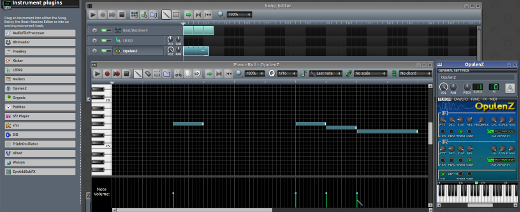

- #HOW TO USE SF2 FILES IN LMMS 64 BIT#
- #HOW TO USE SF2 FILES IN LMMS UPDATE#
- #HOW TO USE SF2 FILES IN LMMS MANUAL#
- #HOW TO USE SF2 FILES IN LMMS PLUS#
What error if any? What is the failure mode. I'm sure some will be able to chime in and help It would be advisable to include specific info as to what you are trying to do and what your failure mode is. there are several threads about Soundfonts and players. sfz is a compressed format and not all players can play them (decompress). then that could be problematic because you will need to use another program to run it (such as BitBridge) in CbB.ĭo note that the soundfont file can be *.sf2 or *.sfz.
#HOW TO USE SF2 FILES IN LMMS UPDATE#
If the app (SFZ Player) is 32 bit, you may have to update the player (or to a player) that is 64 bit. So as long as the player matches your installation (64 bit), the file should load.
#HOW TO USE SF2 FILES IN LMMS 64 BIT#
it is just a file to load into the player (which could be a 32 or 64 bit application). I believe the soundfont file does not come in a 32 or 64 bit version. I'm assuming that you are referring to the player as being 32 vs 64 bit. Rewritten URLs on this mirrored page may not work.Hi - would it be fair to say that a 32bit SF2 (soundfont) file could not possibly play through SFZ in CbB? I have tried without any success. ⚠️ Content here is for search engine crawlers.
#HOW TO USE SF2 FILES IN LMMS PLUS#
mmpk file is not generated.Ībout GitHub Wiki SEE, a crawler enabler for GitHub Wikis as GitHub blocks SoundFont Midi Player is a Midi player plus router and a real time midi synth combo.

$ lmms-pkg -export my-project.mmpz package-directory/ -lmms-exe "D:/Program\ Files/LMMS/lmms.exe" # This does not work On Windows, if your LMMS executable is in a path that contains spaces ("Program Files"), the program fails. $ lmms-pkg -export my-project.mmpz package-directory/ -lmms-exe path/to/lmms You may want to specify the path of the program with -lmms-exe.

However, if you are using a development version that is not in the $PATH, or if you are using Windows, By "properly", I mean the directory that contains the file is in the $PATH variable. This should work if LMMS is installed properly. mmp file in the package by running lmms -d inputfile.mmpz > output.mmp. mmpz file, the program decompresses it into the. $ lmms-pkg -export my-project.mmp package-directory/ -lmms-dir /home/username/LMMS_Data/samples/ You can tell the program to search for them into the repository with -lmms-dir. Some of your samples may be located in the LMMS_Data directory, or in one of those sub-directories. You can decide to not compress the package directory by using -no-zip $ lmms-pkg -export my-project.mmp package-directory/ -no-zip $ lmms-pkg -export my-project.mmp package-directory/ -no-sf2 SF2īy default, SF2 files are exported, if you don't want your soundfont file(s) to be exported, use -no-sf2.
#HOW TO USE SF2 FILES IN LMMS MANUAL#
LMMS Packager manual Export A simple example $ lmms-pkg -export my-project.mmp package-directory/ # It also works with *.mmpz* files


 0 kommentar(er)
0 kommentar(er)
